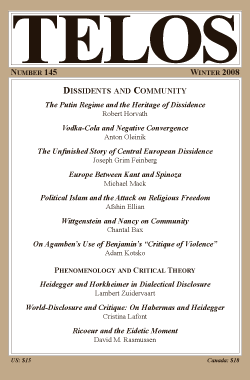Each Tuesday in the TELOSscope blog, we reach back into the archives and highlight an article whose critical insights continue to illuminate our thinking and challenge our assumptions. Today, Etel Sverdlov looks at Robert Hovarth’s “The Putin Regime and the Heritage of Dissidence” published in Telos 145 (Winter 2008), a special issue on “Dissidents and Community.”
 As the child of Russian immigrants who fled the Soviet Union just before it collapsed, I grew up in a unique time-warp. Not knowing the modern Russia, I was raised on Soviet songs, movies, and references. I thought it simply an amusing situation for a child to experience, but as Robert Horvath’s “The Putin Regime and the Heritage of Dissidence” makes clear, this sort of modern disconnect plays a strong, and damaging, part in contemporary Russian politics. Throughout the history of the Soviet Union, individuals of conviction found ways of subtly revolting against the oppressive Communist regime. Once that empire fell, however, these men began to feel the sting of obscurity. Sergei Kovalyov, “the most prominent former dissident in the State Duma,” Vladimir Voinovich, a Soviet satirist, and the most famous of the group, Alexander Solzhenitsyn, the long-bearded writer, all found themselves increasingly irrelevant in the new “democratic” Russia. The generation they belonged to had fallen away. Even Solzhenitsyn, whose books reached international fame, descended into irrelevance after going from a highly publicized and staged homecoming to having his television program canceled due to poor ratings. New issues confronted Russia, and yet the dissidents still seemed to be fighting against the former specter of the oppressive Soviet Union, and with such conviction that, instead of “alleviating the plight of victims of discrimination, disadvantage, and exclusion,” they only succeeded in creating a stigma against dissidents.
As the child of Russian immigrants who fled the Soviet Union just before it collapsed, I grew up in a unique time-warp. Not knowing the modern Russia, I was raised on Soviet songs, movies, and references. I thought it simply an amusing situation for a child to experience, but as Robert Horvath’s “The Putin Regime and the Heritage of Dissidence” makes clear, this sort of modern disconnect plays a strong, and damaging, part in contemporary Russian politics. Throughout the history of the Soviet Union, individuals of conviction found ways of subtly revolting against the oppressive Communist regime. Once that empire fell, however, these men began to feel the sting of obscurity. Sergei Kovalyov, “the most prominent former dissident in the State Duma,” Vladimir Voinovich, a Soviet satirist, and the most famous of the group, Alexander Solzhenitsyn, the long-bearded writer, all found themselves increasingly irrelevant in the new “democratic” Russia. The generation they belonged to had fallen away. Even Solzhenitsyn, whose books reached international fame, descended into irrelevance after going from a highly publicized and staged homecoming to having his television program canceled due to poor ratings. New issues confronted Russia, and yet the dissidents still seemed to be fighting against the former specter of the oppressive Soviet Union, and with such conviction that, instead of “alleviating the plight of victims of discrimination, disadvantage, and exclusion,” they only succeeded in creating a stigma against dissidents.
Although Horvath emphasizes the danger of placing too much importance on the work and reputation of the dissidents, Russian politics under Putin showed a disconcerting willingness to eliminate opponents of the government through the court system, Soviet-style. For example, Horvath notes that in 2002, “Limonov was sentenced to a four-year prison term on charges of plotting to invade Kazakhstan.” Thus a strange paradox consumed Russia. On the one hand, seemingly free from the Soviet past, the population should not need the outdated dissidents; and yet on the other, the stain of the former political regime remained. As Horvath observes, even the former president Putin asserted:
“I was never ‘dissidentizing’ [dissidentstvuyushchim], whether that’s good or bad.” He proceeded to recall, with barely disguised admiration, a KGB operation to thwart a dissident protest in Leningrad to which Western diplomats and journalists had been invited: instead of arresting the demonstrators, the cunning Chekists had organized a massive public ceremony to overwhelm the protest.
In every election in Russia following the fall of the Soviet Union, reformers and dissidents look for a blossoming of democracy. Putin no longer holds the presidency in Russia, and with his stepping down, the West can look hopefully to his successor, Dmitry Medvedev, to provide the much needed democratic change, so stalled under Putin. But as the Soviet past lingers in the career histories of Russian government officials, so too does the former president stay in power as prime minister. Recounting examples of the anti-democratic measures that solidified a dictatorial control for Putin, Horvath’s analysis paints a sober picture of Russia’s undemocratic past and its doubtful future.
Click here to read Robert Hovarth’s “The Putin Regime and the Heritage of Dissidence” from Telos 145. If you are affiliated with an institution that is an online subscriber to Telos, you have free access to our complete online archive. If not, you can purchase 24-hour access to this and other Telos articles at the low rate of $5/article.








